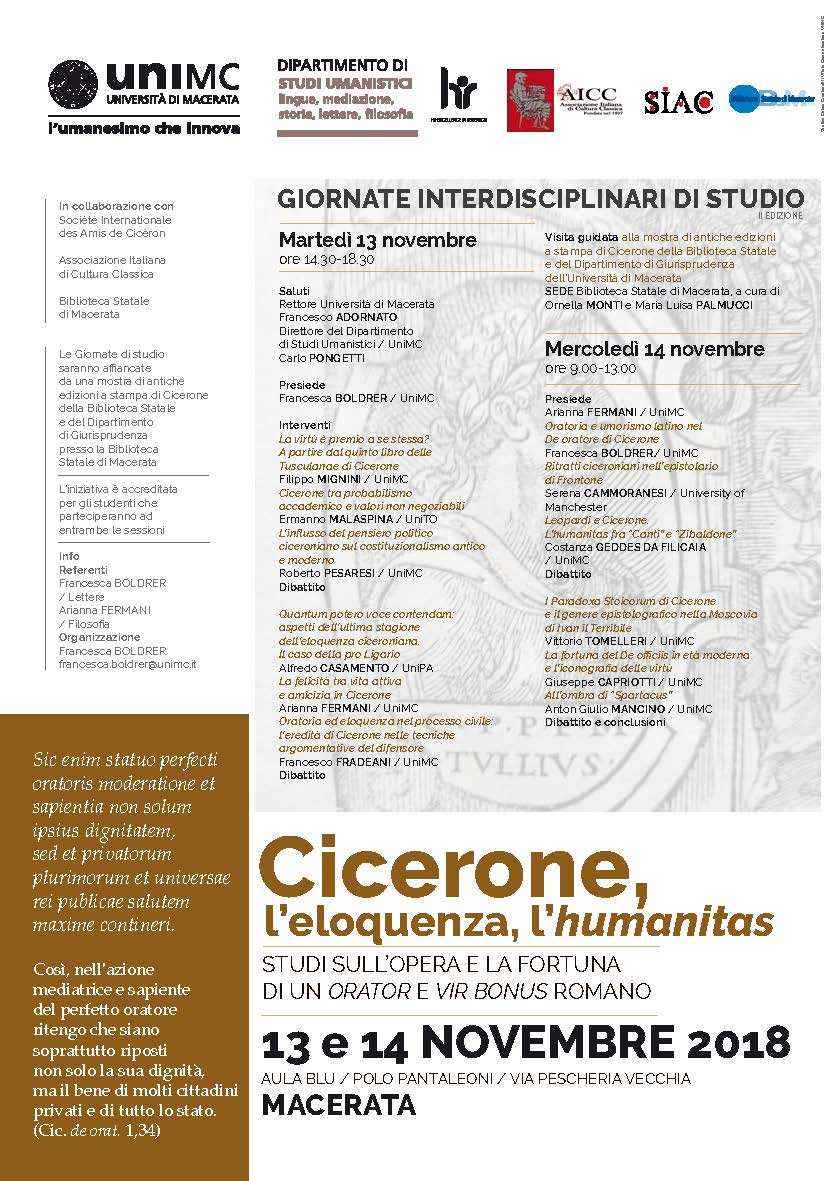Oratoria e umorismo latino in Cicerone: idee per l’inventio tra ars e tradizione - Oratory and Latin Humour in Cicero: Inventio between Ars and Tradition
DOI :
https://doi.org/10.13135/2532-5353/4127Résumé
This paper studies the significance of humour in Roman oratory, a theme dear to Cicero, who claimed expertise in it, and central to book 2 of the De oratore. In a long passage of the work (§§ 216-290), Cicero offers a detailed and systematic account of inventio that fleshes out the sketch presented in the Rhetorica ad Herennium. I argue that Cicero treats this controversial topic in Roman oratory with a sensitivity to the broad range of differing viewpoints held by established orators (including his own teachers). He does so by expertly managing the fine distinction between innovation and tradition, between Greek theoretical works and anthologies of Latin jokes (some of which were compiled by members of illustrious gentes), between utilitas and humanitas.
Il contributo intende approfondire l’importanza dell’umorismo nell’oratoria romana, un tema caro a Cicerone, che ne era esperto, e centrale nel II libro del De oratore. In un’ampia sezione dell’opera (§§ 216-290) l’autore offre un’esposizione dettagliata e sistematica a conclusione dell’inventio, superando largamente gli scarni spunti presenti nella Rhetorica ad Herennium. L’argomento, singolarmente controverso sul piano retorico nel mondo romano per questioni tecniche (ars) e di decorum, viene affrontato da Cicerone con abile dialettica tra diverse e mutevoli opinioni, attribuite ad autorevoli e arguti oratori e ai suoi maestri, ricercando un prudente equilibrio tra innovazione e tradizione, tra trattati greci teorici e raccolte di facezie latine (risalenti anche a membri delle gentes più illustri), tra utilitas e humanitas.
La contribution vise à approfondir l’importance de l’humour dans l’art oratoire romain, un thème cher à Cicéron, qui en était un expert, et au centre du deuxième livre du De oratore. Dans une grande partie de l’ouvrage (§§ 216-290), l’auteur propose une exposition détaillée et systématique à la conclusion de l’inventio, dépassant de loin les maigres indices présents dans la Rhetorica ad Herennium. Le sujet, singulièrement controversé sur le plan rhétorique dans le monde romain pour les questions techniques (ars) et de decorum, est abordé par Cicéron avec une dialectique intelligente entre des opinions différentes et changeantes, attribuées aux orateurs influents et pleins d’esprit et à ses maîtres, à la recherche d’un équilibre prudent entre innovation et tradition, entre traités théoriques grecs et recueils de facéties latines (remontant aussi aux membres des plus illustres gentes), entre utilitas et humanitas.
Téléchargements
Téléchargements
Publiée
Comment citer
Numéro
Rubrique
Licence
Les auteurs qui publient dans cette revue acceptent les termes suivants :
- Les auteurs conservent leur propriété intellectuelle sur le texte soumis et accordent à la revue le droit de première publication, l'ouvrage étant alors disponible simultanément sous Licence d’attribution Creative Commons – qui permet le partage de l’œuvre tout en en reconnaissant la paternité intellectuelle – et la publication initiale dans cette revue.
- Les auteurs peuvent conclure des ententes contractuelles supplémentaires pour la diffusion non exclusive de la version imprimée de l'ouvrage par la revue (par exemple, le dépôt institutionnel ou la publication dans une monographie), à condition d’indiquer une mention reconnaissant la publication initiale du texte dans cette revue.


 Ciceroniana On Line est reconnue par l'ANVUR (Agence nationale d'évaluation du système universitaire et de la recherche) comme revue de classe A pour les sciences de l'Antiquité, la philologie, la littérature et l'histoire de l'art (
Ciceroniana On Line est reconnue par l'ANVUR (Agence nationale d'évaluation du système universitaire et de la recherche) comme revue de classe A pour les sciences de l'Antiquité, la philologie, la littérature et l'histoire de l'art ( Le journal a été approuvé pour inclusion dans DOAJ. La liste des publications DOAJ est disponible à l'adresse suivante:
Le journal a été approuvé pour inclusion dans DOAJ. La liste des publications DOAJ est disponible à l'adresse suivante: 
 La revue est indexée dans
La revue est indexée dans  La revue est incluse dans ERIH PLUS. La liste des revues d'ERIH PLUS est disponible à l'adresse suivante:
La revue est incluse dans ERIH PLUS. La liste des revues d'ERIH PLUS est disponible à l'adresse suivante: 
